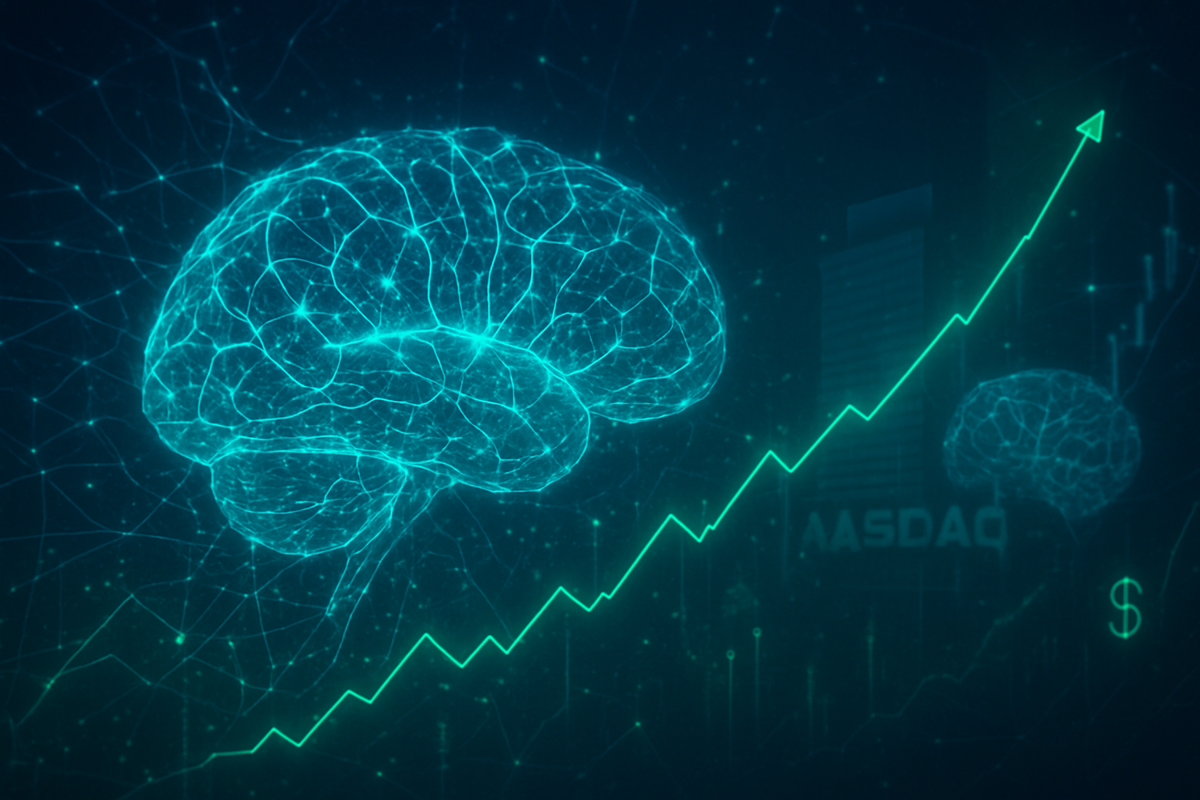Financial News
AI Deal Frenzy Reshapes Tech Landscape, Propelling Nasdaq to New Heights

The past 12 to 18 months have witnessed an unprecedented surge in Artificial Intelligence (AI) related deals, fundamentally reshaping the technology landscape and sending ripples across the Nasdaq and the broader financial markets. From colossal acquisitions and strategic partnerships to record-breaking funding rounds for burgeoning AI startups, capital has poured into the sector at an astonishing rate, driving innovation, market consolidation, and significant shifts in investor sentiment. This "AI gold rush" has been the primary catalyst behind the tech sector's remarkable performance, with major indices frequently hitting new highs on the back of AI optimism.
This intense period of activity, leading up to November 3, 2025, has not only accelerated the development and deployment of AI technologies but has also concentrated significant power and wealth within a select group of tech giants. The strategic maneuvers by industry behemoths like Microsoft (NASDAQ: MSFT), Google (NASDAQ: GOOGL), Amazon (NASDAQ: AMZN), and NVIDIA (NASDAQ: NVDA) are not merely about technological advancement; they represent a fierce battle for dominance in the next era of computing, with profound implications for the future of business, society, and investment portfolios.
Unpacking the AI Investment Tsunami: Key Deals and Market Reactions
The period between May 2024 and November 2025 has been characterized by a relentless stream of high-profile AI deals, underscoring the technology's pivotal role in corporate strategies. Acquisitions have been a significant theme, with companies looking to integrate specialized AI capabilities rapidly. On November 1, 2025, Microsoft (NASDAQ: MSFT) made headlines with its $9.5 billion all-cash acquisition of Synapse AI, a move designed to bolster its Azure cloud services with Synapse AI's advanced "Cognitive Cores" technology. This announcement sent Synapse AI's stock soaring by an astounding 160%, while Microsoft's shares also saw a positive, albeit more modest, gain of 1.8%. Earlier, Google (NASDAQ: GOOGL) strategically acquired DeepVision Technologies for $2.1 billion, aiming to leverage its visual recognition expertise.
Beyond direct acquisitions of AI developers, the demand for underlying infrastructure has spurred massive investments. A consortium led by BlackRock's Global Infrastructure Partners (GIP), alongside Abu Dhabi's MGX and the Artificial Intelligence Infrastructure Partnership (AIP)—which notably includes NVIDIA (NASDAQ: NVDA) and Microsoft (NASDAQ: MSFT)—agreed on October 16, 2025, to acquire Aligned Data Centers for approximately $40 billion. This landmark deal, AIP's first major investment, signals a significant push into dedicated AI infrastructure development. Furthermore, the "Stargate Project," a colossal $500 billion initiative launched in January 2025 by Oracle (NYSE: ORCL), OpenAI, Microsoft (NASDAQ: MSFT), and NVIDIA (NASDAQ: NVDA), aims to build 20 AI data centers across the U.S. over four years, highlighting the immense capital expenditure flowing into foundational AI infrastructure.
Strategic partnerships and massive funding rounds have also defined this era. Microsoft's (NASDAQ: MSFT) long-standing $10 billion investment in OpenAI and the deep integration of AI across its product suite, including Microsoft Copilot, continues to be a cornerstone of its AI strategy. NVIDIA (NASDAQ: NVDA) has solidified its market dominance through alliances with Supermicro (NASDAQ: SMCI), Vertiv (NYSE: VRT), and Google Cloud (NASDAQ: GOOGL), while also investing in xAI. Oracle (NYSE: ORCL) has aggressively expanded its AI cloud offerings, partnering with NVIDIA (NASDAQ: NVDA) to deploy one of the world's largest AI SuperComputers and, in October 2025, with AMD (NASDAQ: AMD) to deploy 50,000 AMD Instinct MI450 Series GPUs on Oracle Cloud Infrastructure (OCI). The market reacted positively to these developments, with Amazon (NASDAQ: AMZN) seeing a stock rise after OpenAI secured a significant deal in early November 2025 to buy $38 billion worth of AI computing power from the cloud giant. Walmart (NYSE: WMT) also entered the fray, announcing a groundbreaking partnership with OpenAI on October 14, 2025, to integrate shopping functionalities directly into ChatGPT. The sheer volume and scale of these deals have fueled soaring valuations and instilled a robust investor confidence in the future growth of AI-driven enterprises.
The Shifting Fortunes: Identifying Winners and Losers in the AI Boom
The relentless pace of AI deals has created clear winners and losers, fundamentally altering the competitive landscape for public companies. Unsurprisingly, the "Magnificent Seven" tech giants – Alphabet (NASDAQ: GOOGL), Amazon (NASDAQ: AMZN), Apple (NASDAQ: AAPL), Meta (NASDAQ: META), Microsoft (NASDAQ: MSFT), NVIDIA (NASDAQ: NVDA), and Tesla (NASDAQ: TSLA) – have emerged as the primary beneficiaries. Their immense capital resources, existing infrastructure, and strategic foresight have allowed them to acquire promising AI startups, forge critical partnerships, and invest heavily in R&D and compute infrastructure. NVIDIA (NASDAQ: NVDA), in particular, continues its meteoric rise, with its stock surging due to the insatiable demand for its GPUs, which are indispensable for AI training and inference. Microsoft (NASDAQ: MSFT) and Amazon (NASDAQ: AMZN) are also major winners, with their cloud divisions (Azure and AWS, respectively) serving as the backbone for countless AI applications and benefiting from massive spending by AI developers. Palantir Technologies (NYSE: PLTR) has also seen its stock up approximately 165% for 2025, driven by strong demand for its Artificial Intelligence Platform.
Conversely, companies that fail to adapt, invest, or integrate AI into their core operations risk being left behind. Traditional software companies that do not quickly transition to AI-powered solutions could see their market share erode. Smaller tech companies without significant capital reserves may struggle to compete for top AI talent or acquire cutting-edge AI technologies, making them potential acquisition targets or rendering them obsolete. Furthermore, the intense demand for AI infrastructure, while beneficial for chipmakers and data center operators, could pose challenges for companies that rely on high-performance computing but cannot secure adequate resources or face escalating costs.
The ripple effect extends to various sectors. Cybersecurity firms like Darktrace (LSE: DARK) have become attractive acquisition targets for their AI-driven defense capabilities, as seen with Thoma Bravo's $5.3 billion acquisition in April 2024. Companies focused on data preparation for AI, such as Innodata (NASDAQ: INOD), and those providing HPC AI infrastructure like TeraWulf Inc. (NASDAQ: WULF), have also seen their stocks soar, indicating a broadening scope of beneficiaries beyond just the mega-caps. However, businesses in industries susceptible to AI automation, without a clear strategy for leveraging AI, might face significant operational disruptions and declining profitability, impacting their long-term viability and investor appeal.
Broader Significance: Industry Transformation and Regulatory Scrutiny
The current wave of AI deals signifies more than just a passing trend; it represents a fundamental shift in the technological paradigm, akin to the internet boom or the mobile revolution. This event fits into broader industry trends emphasizing automation, data-driven decision-making, and personalized experiences across all sectors. The rapid integration of AI is not merely enhancing existing products but creating entirely new markets and business models, from generative AI content creation to sophisticated predictive analytics for healthcare and finance. The "Stargate Project" and the consortium acquisition of Aligned Data Centers highlight the critical understanding that AI's future growth is inextricably linked to robust, scalable, and energy-efficient data center infrastructure, signaling a massive, sustained investment cycle in this area.
The potential ripple effects on competitors and partners are immense. For competitors, the challenge is to either innovate at a similar pace or find niche areas where they can excel. Companies like AMD (NASDAQ: AMD) are directly challenging NVIDIA's (NASDAQ: NVDA) dominance in the AI chip market through strategic partnerships with Oracle (NYSE: ORCL), indicating a healthy, albeit intense, competitive environment. Partners, particularly those in the cloud computing and hardware sectors, are experiencing unprecedented demand, but also face pressure to scale rapidly and maintain technological superiority. The close alliances between hyperscalers and AI developers are creating complex ecosystems where interdependence is growing.
Regulatory and policy implications are also coming sharply into focus. Governments worldwide are grappling with how to govern AI, particularly concerning data privacy, algorithmic bias, and antitrust concerns. The EU AI Act, for instance, is setting a precedent for comprehensive compliance requirements, which could influence regulations globally. This increasing scrutiny, identified as a material risk by over 70% of S&P 500 companies, could lead to significant compliance costs and potentially slow down certain aspects of AI development or deployment, especially for larger players. Historically, similar technological shifts have often led to periods of intense regulation, and AI is proving no exception, with concerns ranging from job displacement to the ethical implications of autonomous systems.
What Comes Next: Navigating the Future of AI Investment
Looking ahead, the short-term future will likely see a continuation of aggressive AI investments and strategic maneuvers. Companies will continue to pour capital into research and development, particularly in areas like multimodal AI, edge AI, and specialized AI models for various industries. The demand for high-performance computing infrastructure, especially advanced GPUs and next-generation data centers, is expected to remain insatiable, driving further partnerships between chipmakers, cloud providers, and infrastructure developers. We can anticipate more acquisitions of smaller, innovative AI startups by larger tech firms looking to quickly integrate cutting-edge capabilities and talent. The "Stargate Project" exemplifies the long-term vision of building out a foundational AI infrastructure that will serve as the backbone for decades to come.
In the long term, the market will likely see increased consolidation, with a few dominant players emerging in key AI sub-sectors. However, new market opportunities will also arise, particularly for companies that can develop specialized AI solutions for underserved industries or create innovative applications that leverage AI in novel ways. The ethical and regulatory landscape will continue to evolve, potentially leading to new standards and compliance requirements that could influence strategic pivots. Companies may need to adapt by prioritizing responsible AI development, investing in robust governance frameworks, and engaging proactively with policymakers.
Potential scenarios include a sustained, healthy growth trajectory for the AI market, driven by continuous innovation and expanding applications. Another scenario could involve increased regulatory intervention, potentially slowing down growth in certain areas but also fostering greater trust and responsible deployment. Investors should watch for continued capital expenditure announcements from major tech companies, the emergence of new AI unicorns, and any significant shifts in regulatory policy. The ability of companies to effectively integrate AI into their core business models and demonstrate clear ROI will be crucial for sustained success.
Wrap-Up: A New Era of Intelligence and Investment
The recent flurry of AI deals marks a pivotal moment in technological history, signifying the dawn of a new era where artificial intelligence is not just a tool but a foundational layer of modern commerce and innovation. The key takeaway is the sheer scale and speed at which capital is being deployed into AI, driving unprecedented growth and transformation across the tech sector and beyond. This has propelled the Nasdaq to new heights, largely on the back of investor optimism and the tangible advancements brought about by these strategic investments and partnerships.
Moving forward, the market will be characterized by intense competition, rapid technological evolution, and increasing regulatory scrutiny. The "Magnificent Seven" will likely continue to dominate, but opportunities abound for agile companies that can carve out niches or provide essential infrastructure and services to the AI ecosystem. Investors should pay close attention to companies demonstrating clear AI integration strategies, strong financial performance driven by AI products, and proactive approaches to ethical AI development and regulatory compliance.
The lasting impact of this period will be a fundamentally re-architected global economy, where AI-powered solutions become ubiquitous, enhancing productivity, personalizing experiences, and solving complex challenges. While the path ahead will undoubtedly present challenges, the current investment frenzy underscores a collective belief in AI's transformative power, making it the most significant technological and investment theme for the foreseeable future.
This content is intended for informational purposes only and is not financial advice
More News
View More



Recent Quotes
View More
Quotes delayed at least 20 minutes.
By accessing this page, you agree to the Privacy Policy and Terms Of Service.



